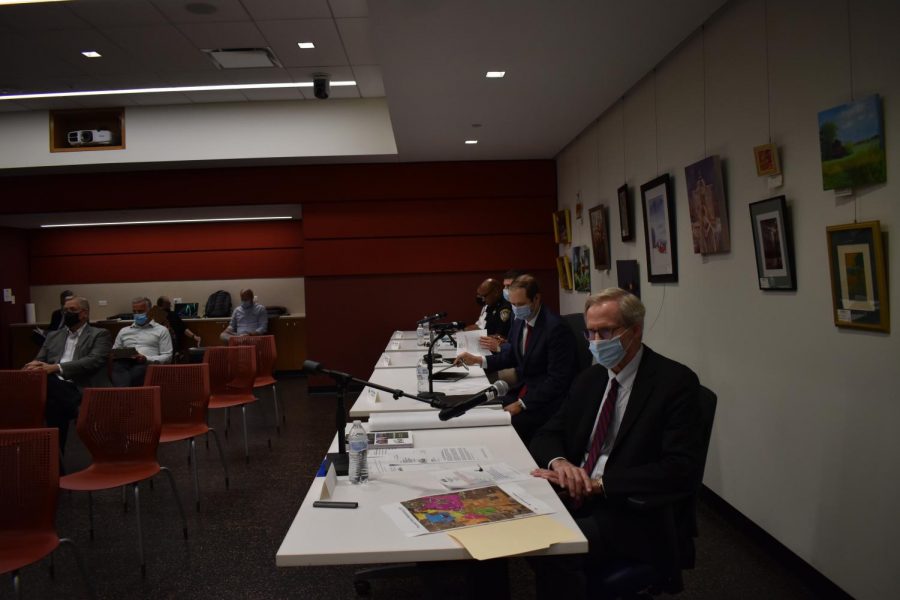City Council unveils possible financial plan
The new plan will replace the current strategic plan that was originally supposed to run until 2025.
City Manager Bill Nicklas at the City Council meeting Monday, talking about new financial plan that will be used from 2022 through 2024.
DeKALB – A draft of DeKalb’s financial plan for 2022 through 2024 was unveiled at a special joint meeting with the City Council and the Finance Advisory Committee on March 14 in the DeKalb Public Library, 309 Oak St.
The plan was brought forward by City Manager Bill Nicklas and Finance Director Carrie Dittman and focused on the financial side of improving life in DeKalb.
“We ought to keep, as best we can, to a certain amount of fiscal prudence,” Nicklas said. “We are going to continue to build on economic development that has happily flowered in our community here, in the last three years in particular, and we’re going to try to be prescient about the future.”
This desire led to the creation of a three-year plan; however, the plan is still in the early stages and it is expected to be tightened up once the city’s tax numbers are available in about 30 days, Nicklas said.
“That means what we’re talking about is a best guess,” Nicklas said. “It’s pretty close we think, but there could be some surprises. There’s going to be some refreshing that has to be done to bring truer data to the floor.”
CURRENT FINANCIAL SITUATION
After Nicklas introduced the plan, Dittman discussed the general operations of it including the key revenues of property taxes, sales taxes and fines. Property taxes and sales taxes are especially important and the largest sources, Dittman said.
It’s projected that, in 2021, $6,522,456 was raised in property taxes while $16,554,942 was raised in sales taxes, according to the draft of the financial plan.
Another important piece of revenue is $10,422,954 from the American Rescue Plan Act. Given in two installments, the city of DeKalb received half of the money last year and will receive the rest in a few months, Dittman said. The money must be obligated by the end of 2024 and spent by the end of 2026 and can be spent on nearly anything except in circumstances like legal settlements and rainy day funds.
So far, the money has been used for rehiring public safety personnel, replacing lead pipes and relocating tenants.
The city is also projecting its revenue will grow over the next three years due to new development while the tax rate is going down.
“We’re actually gaining more property taxes while residents and businesses are paying less,” Dittman said.
FINANCIAL FLYTRAPS AND OTHER CONCERNS
One program that eats up a chunk of the city’s revenue is the pensions for police officers and firefighters, which was funded locally by property taxes; however, new legislation has been passed where a statewide board will control the pensions.
“In the meantime, there’s nothing we can do except fund the actuary which keeps getting bigger every year,” Dittman said.
Nicklas compared the soon-to-be-diminished plan to the man-eating plant Audrey II from the off-Broadway musical “Little Shop of Horrors,” which keeps growing larger the more it consumes.
“If it continues unabated, we will be in difficult trouble in three to four years,” Nicklas said.
Other challenges include a decreased population. As the population dropped from 44,000 to 40,000 in the last 10 years, income tax revenue has also decreased.
However, the good news is that because the budget was conservatively budgeted, it shouldn’t affect much, Dittman said.
Nicklas also highlighted challenges to the plan that could hinder its success.
“We are struggling, although not as much as 2017 and 2018, in coming up with enough money on an annual basis to keep up with street repair costs that come up every year,” Nicklas said.
The city has come close to meeting a goal of enough money to repair roads in the summer, but more needs to be raised.
“Identifying a problem is part of it and solving it is another,” Nicklas said.
PROBLEM-SOLVING AND THE FUTURE
Currently, DeKalb needs $600,000 for street maintenance and $215,000 for fleet replacement, according to the financial plan. All of this will be to keep pace with street deterioration. Possible sources of revenue that Nicklas was not recommending included raising property, gas and sales taxes.
One solution Nicklas proposed in the plan was to use the cannabis tax as a possible source for future city revenue.
“We currently don’t have a dispensary in town,” Nicklas said.
Within the first year of establishment, a dispensary could gain anywhere from $200,000 to $400,000 in city revenue, Nicklas said.
“If we had two (dispensaries), that would just about close the gap,” Nicklas said.
Nicklas also brought up the possibility of more federal aid thanks to the passage of the federal infrastructure bill the Biden administration signed into law in November.
The bill could generate roughly $949,000 for DeKalb but it will be dispensed differently than the American Rescue Plan Act. The city would have to apply for grants and there are no guarantees. However, the funds could be available next year.
When it comes to summer repairs in the city’s budget, Nicklas said “we have a little bit of slack but not a lot.”
After the plan was unveiled, Nicklas recommended that the city council and Finance Advisory Committee reconvene after the audit of the 2021 fiscal year.
















